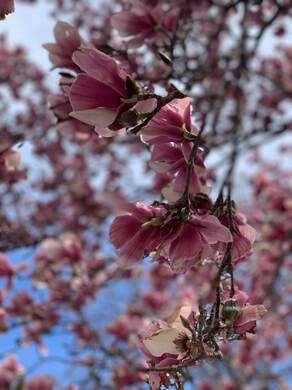 by Laura Crosby dedicated to Aja The Mindfulness Study Group spent the last year reading In the Face of Fear, Buddhist Wisdom for Challenging Times, (edited by Barry Boyce and the Editors of Shambhala Sun). A compilation of essays from beloved contemporary mindfulness teachers, the book explores how our state of mind and our reactions to fear, uncertainty, and difficulty influence the ways we ride life’s waves and access our natural compassion, equanimity, and resilience. Facing fear and cultivating wisdom together in challenging times felt uniquely relevant going into 2020 and proved essential throughout. In fact, we chose In the Face of Fear in 2019 – before the pandemic; before the killings of Breonna Taylor and George Floyd; before the election; before, before, before. Looking back, we were friends in facing fear. Friends in traversing a fearful time. Friends in courage, wisdom and loving farewells. We explored gems of insight from the Dalai Lama, Pema Chödrön, Thich Nhat Hanh, and others as they wrote about the times we live in and how to see things as they really are, transform suffering into joy, have courage and a sense of humor, and so much more. Here are a handful of the teachings we enjoyed: “Like a teaspoonful of salt placed in a pond full of fresh water rather than a narrow glass, if our measure of fear is arising in an open, vast space of heart [awareness], we will not shut down around it. We may still recognize it as fear, we may still quake inside, but it will not break our spirit.” – Sharon Salzburg “You imagine that certain conditions are necessary to your happiness, but deep looking will reveal to you that those are the very things that are making you suffer.” – Thich Nhat Hanh “Hardships are the major catalysts for change and development in our lives; they wake us to how we create suffering through our own attitudes and intentions, our actions and relationships.” – Polly Young-Eisendrath “… how I feel about someone is up to me and … my feelings do not ultimately depend on the person, his or her behavior, or the situation.” – Joseph Goldstein “Ultimately, it’s awareness that heals … Feel the energy in the body as you focus on the “whatness” (rather than the “whyness”) of your experience.” – Ezra Bayda. As one of our members offered, what would now be like if there was no problem to solve? “The beginning of being fine is noticing how things really are… and if there is blame or outrage, or fear, noticing that without blame, outrage or fear. With such noticing, compassion enters.” – John Tarrant Stay tuned for news about our next book. All are invited!
0 Comments
|
Archives
July 2024
|

